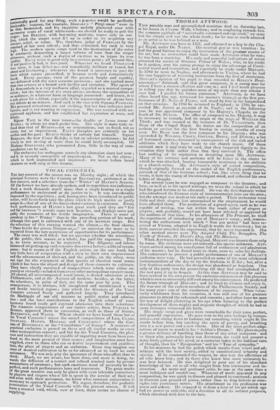VOCAL CONCERTS.
THE last concert of the season was on Monday night ; of which the principal features were the Cantata of BEETHOVEN, performed at the first concert, and a selection from the" Winter " of HAYDN'S Seasons. Of the former we have already spoken, and its repetition wasjudicious. Such a work demands much more than a single hearing or a single performance to understand or do justice to it. It was considerably improved by the repetition ; and, having once been introduced to public notice, will henceforth take the place which its high merits so justly assign it—that of one of the finest choral cantatas in existence. Every fresh performance of HAYDN'S last great work (and they are "few and far between ") reveals some new beauties, and displays more pal-
pably the resources of his fertile imagination. There is more of grandeur in his " Winter" than in the preceding portion of his work, although this part is enlivened with one of its merriest songs. But the selection of this evening wanted the climax— the final chorus, "Dann bricht der grosse .Morgen all,—" an omission the more to be regretted from the rare occurrence of opportunities for its performance.
The room was well filled : but we question whether the attendance of the public, this season, as a whole, has paid the expenses. This is, on every account, to be regretted. The diligence and labour bestowed on getting-up such concerts deserves a better—a liberal recom- pense: but it seems as if the English artists, on the one hand, had
very little love of coOperation with a view to their own improvement
and the advancement of their art, and the public, on the other, were not ripe for the enjoyment of that species of classical vocal music which it has been the object and design of these concerts to cultivate. They have chiefly consisted of compositions which were either ex. presslyor virtually excluded from every other metropolitan concert-room. All choral, all unaccompanied vocal music, is denied admission at the Philharmonic, and at the Ancient all modern : besides, at the latter, the selections, in point of fact, are the same year by year. This arrangement, it is obvious, left unexplored and uncultivated a vast and fertile musical region ; into which the directors of the Vocal Concerts entered freely and gathered largely. They introduced the Madrigals of our old masters to public notice and admira- tion : and the later contributions to the English school of vocal harmony found ready and constant admission into their selections.
The dramatic compositions of our native artists, from PURCELL to BISHOP, appeared there in succession, as well as those of Semi, BEETHOVEN, and Wt.isee. Where should we have heard these but at the Vocal Concerts ? where the sacred compositions of LEO, CLARI, STEFFANI, HAYDN, MOZART, and Citeuuntst? where the Can- tata of BEETHOVEN or the " Crucifixion " of Seoint ? A sentence of
practical exclusion is passed on these and all similar works in every other metropolitan concert ; and but for the Vocal Concerts, the plea- sure and instruction they are capable of imparting must have beet) con- fined to the mere perusal of their scores ; arid imagination must have supplied, even to those who can so derive improvement and gratifica- tion, the place of singers and an orchestra. Some may imagine our state of musical cultivation to be so far advanced as to need no such assistance. We can only pity the ignorance of those who affect thus to think. Much, we are aware, has been done, and more is doing, to- wards the diffusion of a correct and refined musical taste by private associations of amateurs ; but such exertions must of necessity be im. Perfect, and such performances lame and inaccurate. The great works of the great masters can only be given with even tolerable correctness
by players and singers whose life is spent in the service of their art ; and even with their assistance, we know what constant cofiperation is necessary to approach perfection. , We regret, therefore, the probable termination of the Vocal Concerts with the present season. It will leave a musical void, which, now at least, there seems no chance of supplying.


























 Previous page
Previous page